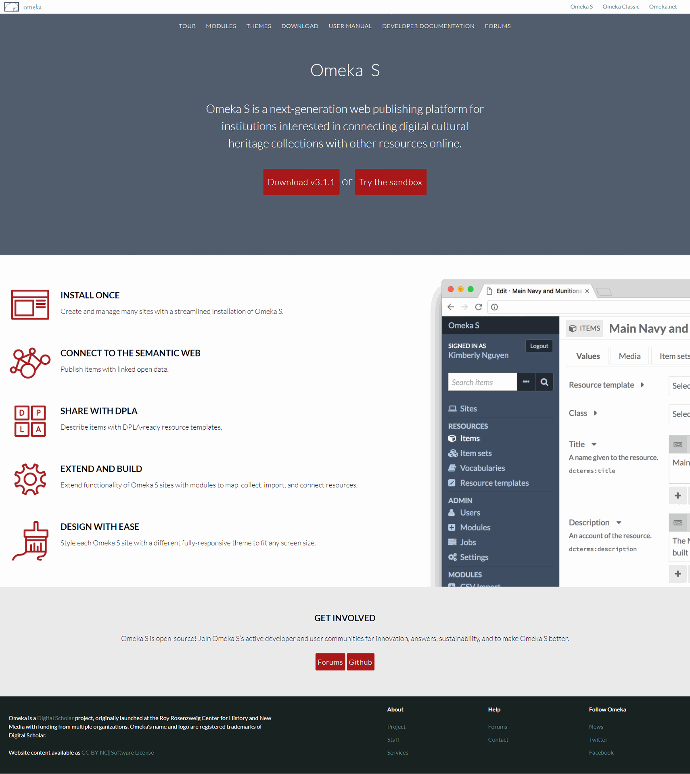Online repositories and virtual exhibitions
Digital dissemination of cultural heritage
We help institutions to publish their patrimony collections and research findings
Spreading heritage online may seem a difficult task
How to deliver on my patrimony potential? How to publish on the Internet without IT knowledge?
-
Difficulty for users to reach patrimony
-
Complexity and cost of implementing a specialized software
-
Complicated and restrictd nonspecialized tools
Our solution
Web repository with Omeka S
The straightest way of delivering on the collections' potential through free software
Some customized projects by Libnamic using Omeka S:
Advantages
Patrimony dissemination
Facilitates public access without restrictions
Accessibility and outreach
-
Allows general consumers and researchers accessing the documents without moving at any time
-
Keeps documents protected, as physical access is not necessary
-
Since these contents are disposed on the Internet, more people will get to know the gems of your collection
Promotes physical visits
-
Way of promoting tourism or researchers visit
-
Boost the institution prestige and get more people to know their collections themes
-
To have an online repository is the first step for its promotion at Europeana
Social participation
-
Collection of data that is provided by the users
-
Citizen Science initiatives: allow involvement while providing personal documents or knowledge
-
Allows collecting key historical testimonies that would be hidden otherwise
Powerful, economical and easy to use
Designed taking your needs into account
Powerful platform
Omeka S and Libnamic Suite allow meeting most of the needs without approaching difficult procedures
Easy to manage
Simple platform using well known technologies
-
Daily management without knowing about informatics
-
Community help for free is possible
-
Self-management: no dependency on the supplier and fewer costs
Interoperability and connectivity
-
Semantic web: structured data that is legible by other systems
-
OAI-PMH protocol: collection of data by aggregates as Hispana and Europeana
-
Libnamic tools allow the registers' exhibition in EDM format, that is recquired by this platform
Open data
-
Makes repository data available
-
Information reuse by the society members
-
Helps to foster researching and popularizing the collection
Moreover...
Free software
-
Omeka is an open source project supported by some well known universities that ensures its future
-
Ideal for the administration: a solution that is more economical, more sustainable and more flexible than an exclusive software
-
Since we do not choose a fully exclusive software, our clients do not depend on Libnamic as a supplier; we do not want our clients to be trapped
Join tens of institutions that are already our clients
Let's work together!
How does a repository work?
Why Libnamic?
We understand the technology, but also the specific needs in Humanities
We create the best solutions applying the benefits of the latest technology to the culture and research field
We are worldwide referents for Omeka projects
-
We have been working with Omeka for more than seven years, even before Libnamic was founded. It positions us as experts in this field forefront.
-
During this period of time, we have developed our own methodologies and exclusive tools, leading us to an unrivalled comprehension of it.
-
We understand the cultural professionals and the public sector needs since we've been in their shoes. Libnamic was precisely founded to respond to the shortage and undeveloped areas that we detected during our working experience at a univerity library.
-
Despite the fact that our focus is made on Humanities, our company also innovates constantly in technology and processes. Furthermore, we shift to our clients the advantages of the latest engineering trends and the results of our private researches, such as Libnamic Hosting.

Our director and founder — Jesús Bocanegra— worked in the University of Seville library as data transmission specialist. It was there where he discovered the technical needs of this institution and the problems they were facing.
After this experience, he decided to found Libnamic to provide technical solutions from a unique perspective that was acquired due to combining his knowledge gained in this field and his studies in Telecommunications Engineering.
Clients y projects
Some institutions we have collaborated with
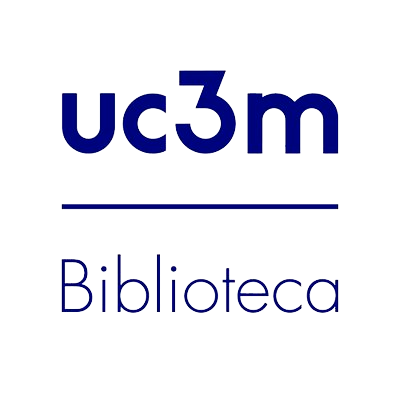
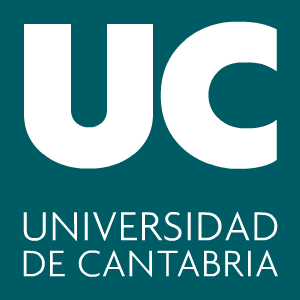

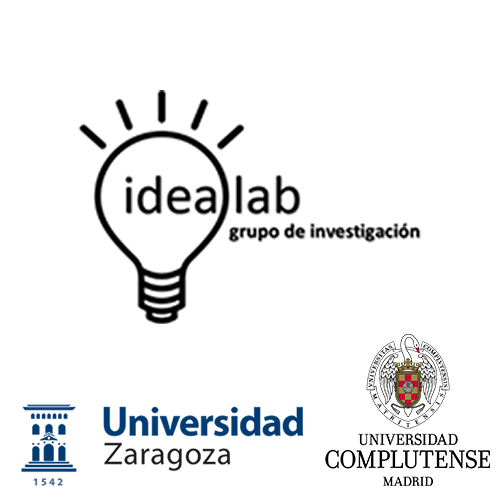




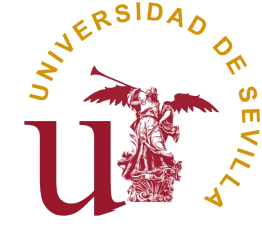
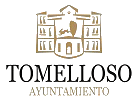


Initial bundle
We have prepared these bundles with everything you need to achieve a repository for your institution for an affordable fixed price.
From $2.500 / first year
Training
Data import
Premium themes
Consultancy
hours
Libnamic Suite
Hosting
All packages include, to some extent:
How do we do it?
Setup
We install Omeka S at our hosting or your institution servers and we make the initial setup
Consultaion
Together, we look at the concrete needs and draw up a plan to import the resources
Import
We look at the metadata to be used to describe the resources, and then we import the records
Construction
We build the public part of the repository and customize the theme to conform it to your institutional image
Release
We have the training session, resolve your questions and publish the site
Introductory offer: free layout to customize Omeka interface
When we create customized themes, our design team prepares an original proposal for the interface that can be checked by the customer on Figma design platform.
For a limited period of time, we include within any bundle the creation of a design for the customization of the Libnamic theme.
Without this offer, this service would cost among $400 and $1200, depending on the bundle.
Would you like to start your own project?
We will assist you with your Digital Humanities project
Advantages of a web repository
-
Contents dissemination
-
Interoperability
-
Powerful platform
-
Promotes physical visits
-
Interoperability and connectivity
-
Open-source based
-
Easy to manage
-
Social participation
-
Open data
Do you need a custom solution?
-
For customized progress or designs
-
If you already have Omeka installed
-
If you just need training
-
If you just need us to stick to your budget
Contact us to take a look at your needs
-
You are not sure which is the best solution for your case
-
If you'd like to try Omeka first
-
Highly specific use cases
We are at your disposal.
FAQ
Records can be directly imported into Omeka S from a correctly formatted Excel or CSV file. For multimedia files to be included in the records, it is needed to reference the files names from the list and then to upload them to the server. It is also possible to reference online files, indicating their URL. Within the bundles, we include the Libnamic import of one or several collections using this method. Data migration from other platforms or databases must be budgeted apart since it is a more complex task.
Themes are code bundles that help Omeka's open part look like and being structured as you wish. Varied free themes can be found at Omeka's community. However, they usually may be quite simplistic and they do not comply with the aesthetic and functional needs of our clients. Although minor changes can be done on basic themes style, it is a structural change or just a better basis to work that is normally needed. The clients with customized works usually ask us for new themes based on an original design, but it is such a long and expensive process that may be unnecessary.
Due to all these reasons, Libnamic decided to create a series of own themes that provide a high-quality foundation to any project. Apart from being attractive, these themes easy to configure to allow certain level of customization for each client without programming any code change. Even when the latter is the case, Libnamic Suite supports a hierarchy of descendant themes, which facilitates the development of extensions to official and Libnamic themes that do not prevent them from being updated.
With few exceptions, Libnamic provides the training online, in video call format using its Libnamic Meet platform.
The bag of hours included within the bundles or additionally contracted can be used for any Libnamic services made for Omeka S. Among them:
-
Consultancy and advice on the use and administration of Omeka
-
System administration for the deployment, upgrade, and maintenance of Omeka S and its servers
-
Themes design and modifications
-
Additional training, support, and troubleshooting
-
Themes and modules development
-
Data import
If the hours initially included or budgeted are insufficient for the work that is eventually required, they can be extended at any time. To account for their spending, Libnamic employees record time sheets with each session spent on the project. The client can view these timesheets and the total usage of hours in their management panel.
Omeka installations are deployed on Libnamic Hosting, the other major line of business of our company. In addition to the speed guarantee it offers, our hosting is highly specialized in Omeka S and allows you to automate installation, updating, monitoring and maintenance operations. The use of other providers may involve higher costs by having to access other systems and platforms. If you have any concern or special need in this regard, we recommend you to contact us to discuss it.
The bundles are simply groupings of services that provide an aesthetic and functional repository, but they do not provide for large customizations and do not cover all cases. If you need additional services to any bundle or you want a customized project, contact us and we will prepare a quote tailored to your case.
Vocabularies or ontologies determine the properties (e.g., title or author) and categories (e.g., text or image) that can be used to describe records in Omeka S. By default, the software includes the Dublin Core, Friend of a Friend and Bibliographic Ontology vocabularies. However, it is possible to import existing ontologies via a file, and Libnamic Suite Metadata includes the Ontology Designer, a tool that allows you to create and modify these vocabularies using a convenient interface. Libnamic also has some ontologies already created for other projects, such as one based on the cataloging rules of the Spanish Ministry of Culture.
Beyond the configuration options of Libnamic themes, customization requires code changes to be made by our technical team. Starter bundles include a certain number of hours that can be used to design and develop modifications to the base themes. The hours spent will depend on the complexity of the changes.
In case what you need is a completely customized theme, contact us and we will give you a custom-made budget.
Libnamic Suite is a set of modules for Omeka S that provides additional functionality to the application and is commercialized as an annual subscription license. The features of the Libnamic Suite are detailed in this site.
During our projects, we detected certain features that our customers wanted but that were not available in Omeka S. These features often involved a high cost, difficult to be addressed by a single institution. The first functionality we came across in this situation was multi-language support. As a result of this and other features, we came up with the idea of creating a subscription product that would allow all of our interested customers to enjoy all of these tools while sharing the cost. In addition, customers can propose features they need and Libnamic implements them in the software for all users to enjoy. Libnamic Suite has helped to reduce costs for each institution by being able to have very advanced functionalities for an affordable price and save on consulting costs. The Suite allows users to have more autonomy and fewer hours of technical advice and programming are required.
Starter bundles are designed to create a new repository, but maintenance is usually required in subsequent years and customers often need hours for support and upgrades. At the end of the first year, Libnamic works with customers to renew the plan based on their estimated needs and budgetary possibilities.
The budget for subsequent years will depend on the repository expansion plans and support needs, but there are also fixed costs related to Libnamic Suite hosting and licensing.
If the customer is unwilling or unable to renew the contract, Libnamic will provide a copy of the repository before disconnecting the repository at Libnamic Hosting. If the repository is on a customer's server, it can continue to be used without limits, including Libnamic Suite, but will not receive feature and security updates nor support.
Omeka S has a system of users and permissions that allows its use by any number of people. To avoid data loss due to human error, it is convenient to adjust access levels and permissions so that each user can only work with the data he/she really needs.
Libnamic's goal is always to provide the client with as much autonomy as possible when creating content and managing its repository. To this end, we have created tools such as Libnamic Suite, which helps to edit the website without requiring computer knowledge or having to contract many hours of support. The training sessions are also geared towards making users self-sufficient in daily tasks. Of course, the Libnamic team will be available to answer any questions or create this content professionally if the client so desires.
Libnamic Suite Metadata includes tools to get the Omeka repository to expose log data in the format required by these platforms, EDM. However, it is the customer's responsibility to get an agreement with Hispana or the desired platform for the collection of this data. The client must also describe the logs in a way that complies with the standards set by the platforms at any given time.
Omeka S is a PHP software that only needs a MySQL database, so it has no special requirements and can be installed on almost any server. Starter bundles include hosting in our infrastructure for convenience and quality of service. If you need to install Omeka on a server of your institution, let us know to study the case. We usually offer to replace the hosting with installation work on another server without incurring higher costs.
It is usualy an image, video, audio, 3D models or document files that are uploaded to Omeka. The software can be configured to allow other file types to be uploaded, but in these cases it is usually necessary to program a modification to the theme to allow them to be displayed on the web.
The OAI-PMH (Open Archive Initiative-Protocol for Metadata Harvesting) protocol allows data from all records in an Omeka repository to be exposed for automated harvesting by other platforms. The OAI repository presents records grouped by collection and in various metadata formats. This protocol is geared towards information reuse and understanding by other programs, and is what enables aggregation on platforms such as Hispana and Europeana.
The IIIF protocol (International Image Interoperability Framework) makes it possible to publish the media (images) of a repository, associating them with the metadata of the records. One of the most important uses is the visualization of these images in viewers such as Mirador or Universal Viewer.
Although Omeka is a content management system that allows you to create sites and pages like many others, it also includes unique features that facilitate its use in a heritage or research environment. By storing record descriptions in a structured way in metadata fields, reusability is enhanced and interconnection possibilities with other systems are increased. In addition, Omeka's ontology system allows describing records in a very precise and standards-compliant way, which would not be easy to do by creating specific taxonomies or simple content pages in other CMS such as WordPress.
Sure you can! Contact us and we will provide you with a free trial.
